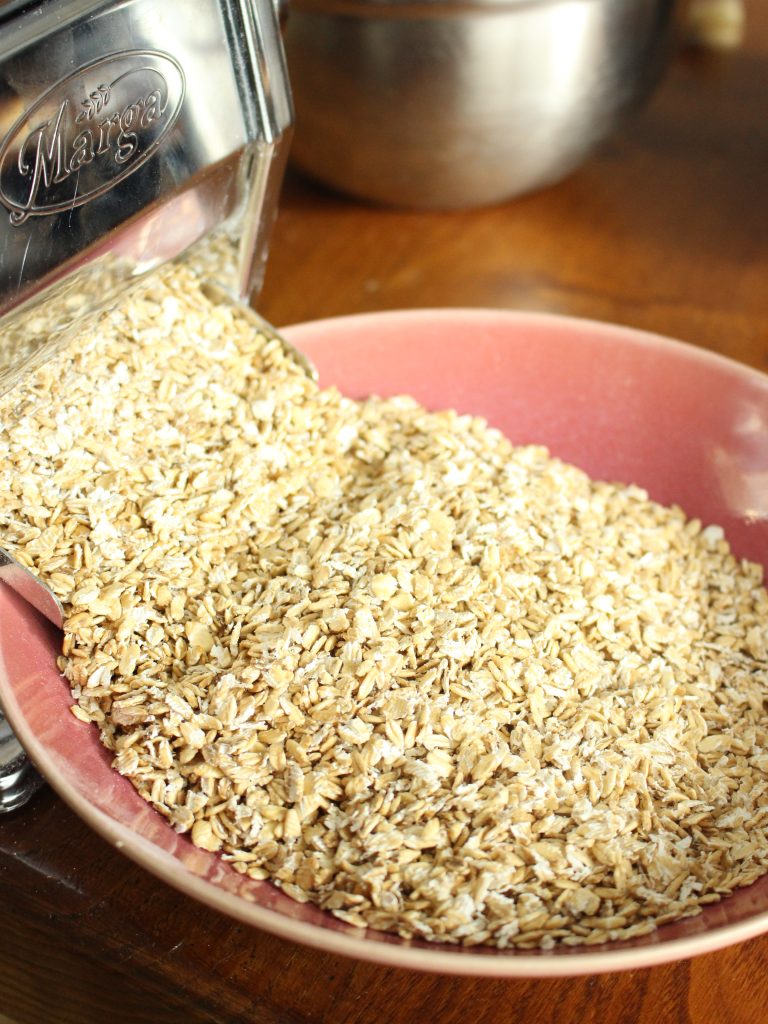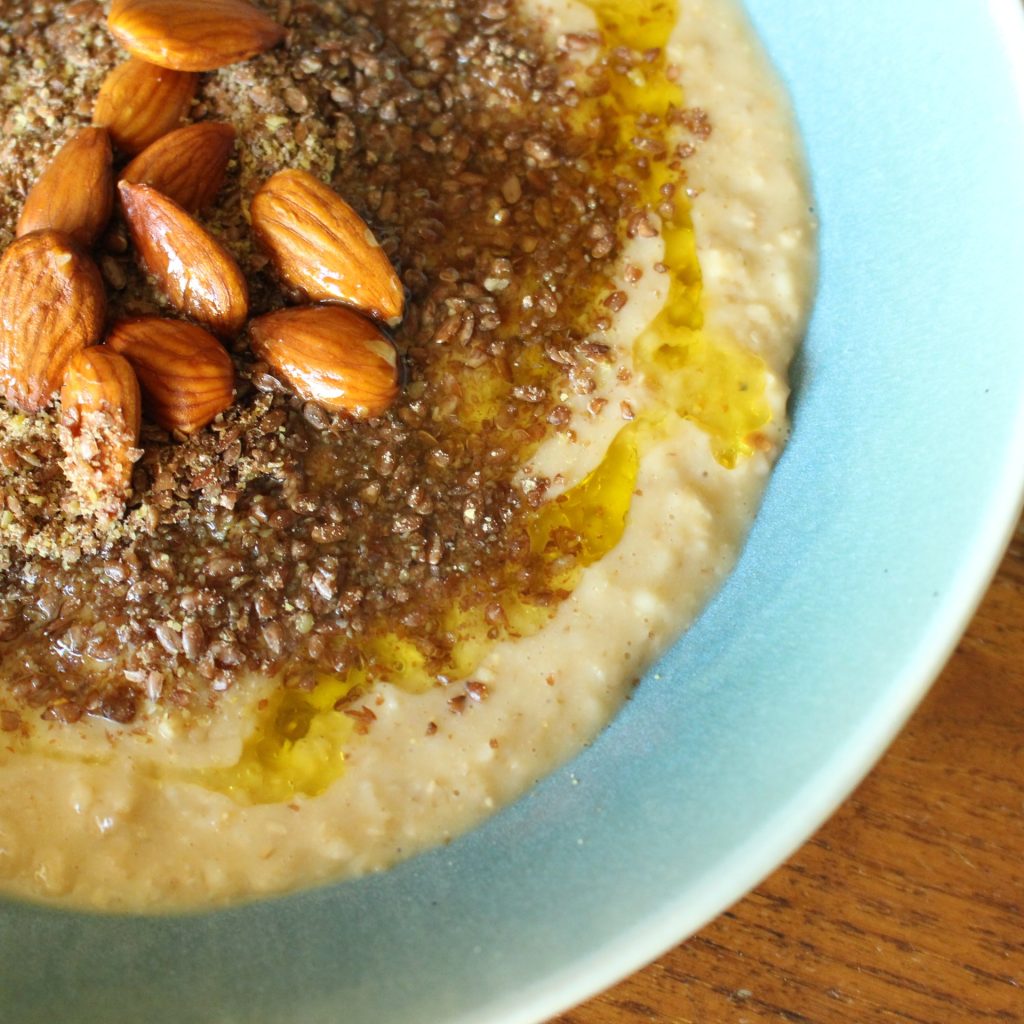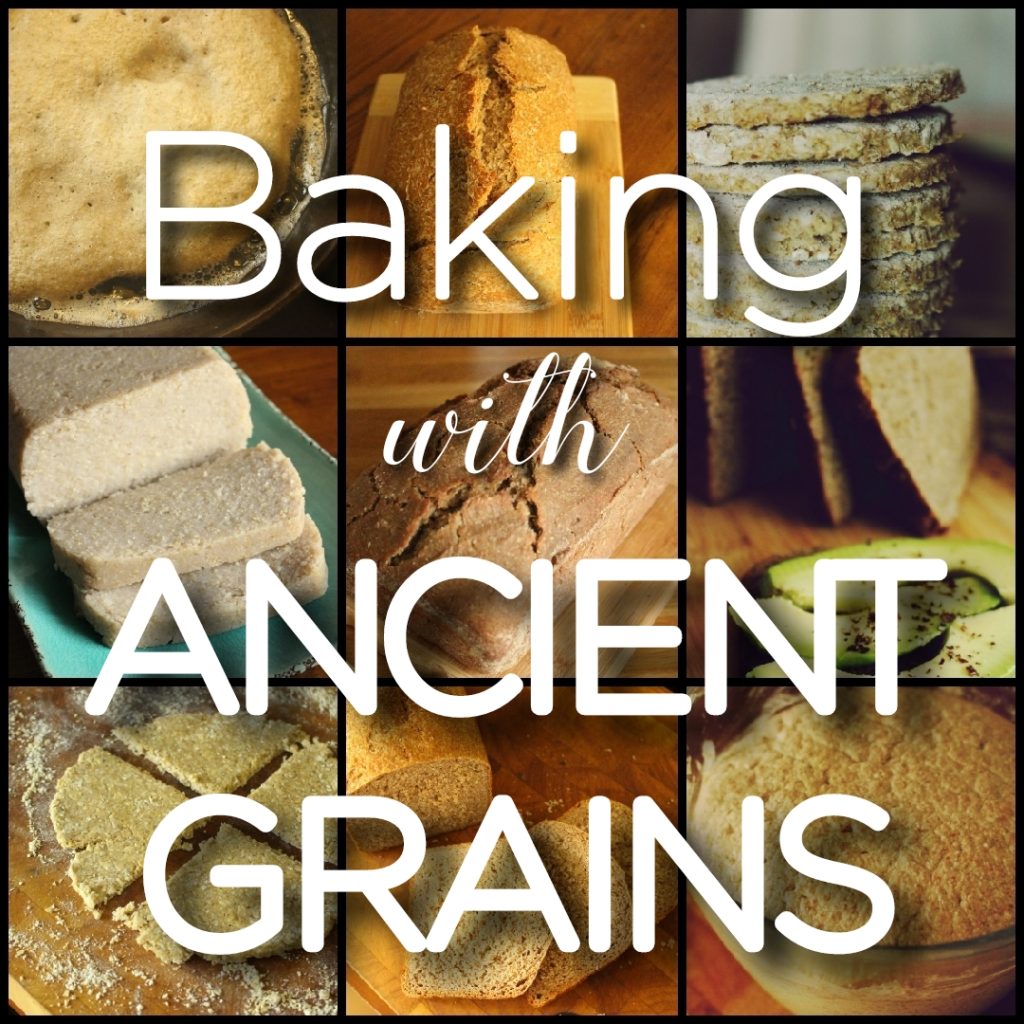Oatmeal, or porridge, is a wonderful way to start the day. And soaking your oats the night before you cook them can make the breakfast you consume tastier, easier to digest and more nutritious.

Soaking oats potentially, depending on how you do it, performs several actions:
- It hydrates and softens the grain, meaning your digestive system has an easier time with assimilation and you don’t lose water as that happens.
- It imbues the oats and soak water with probiotics, meaning that when you cook your oats, they’ll be full of postbiotics and paraprobiotics which are incredibly health-giving.
- It gifts the oats a tangy ‘sourdough’ flavour.
- It can neutralise the mineral-stealing phytic acid, meaning that when you consume the oats, you’re maximising your ability to absorb minerals.
Soaking your oats in water will accomplish number 1 above – softening your grain and making it easier to digest.
Soaking your oats in water and an acidic medium with live probiotics (i.e. sourdough starter, milk kefir, apple cider vinegar) will achieve numbers 1, 2 and 3 above – you’ll have probiotic-containing, tangy, easy-to-digest oats. It may also go some way to step 4 – studies have shown that, in some conditions, yeasts and bacteria can work to neutralise phytic acid.
But, in order to achieve all four of the above; to do our best to neutralise the mineral-stealing phytic acid in oats, we need to include a freshly-ground, high-phytase grain in the soaking mix. To understand why, read my article The Low Down on Oats and Phytic Acid.
So let’s talk practicalities:
The Best Way to Soak Oats
What you’ll need:
- Oats, rolled or flaked
- Freshly-ground rye flour (or for gluten-free you can use freshly-ground buckwheat)
- Non-chlorinated water
- Acidic ‘live’ medium: sourdough starter, milk kefir, sauerkraut juice – anything that comes from an unpasteurised ferment
The amounts I use for breakfast for three people are 150g oats, 20g freshly-ground rye flour, 10g starter (I use rye sourdough starter) and 400-600ml of water.
What to do:
- Put the oats into a bowl and add the freshly-ground rye (or buckwheat) flour
- Stir the acidic ‘live’ medium into a jug of room temperature water then add the mix to the oats and rye/buckwheat, stirring well
- Cover lightly and leave at room temperature overnight
In the morning, pour the entire contents of the bowl into a saucepan, add extra water/milk, salt, spices (whatever you love to include!) and cook.

After much research into oats, traditional methods and the science of phytic acid, this is the way I soak my oats.
- The water is softening and hydrating them
- The freshly-ground rye (or buckwheat) flour is providing phytase to help neutralise phytic acid
- The live starter is creating an acidic environment (which is optimal for phytic acid reduction), providing me the benefits of beneficial microbes and giving me that tangy ‘sourdough’ flavour that I love.
If you would like to be able to create freshly-ground flour in your own kitchen, I’d recommend the counter-top stone mills made by Mockmill. It was my research into phytic acid and oats that finally made me take the leap and invest in one, and I could not be happier! You can take a look at the range and hear more about my experience here, and if you would like to purchase a Mockmill (in the US or UK) and use the links on this page, you’ll be supporting the work I do without paying any more for your mill.
If you want to hear me talk in detail on soaking and fermenting oats, listen to Ancestral Kitchen Podcast #70 – Fermenting Oats
If you’d like to try something different with these oats, try my Fermented Oat Bake.

Bring ancient grain baking into your kitchen!
Download my free 30-page guide with five healthy and tasty 100% ancient grains recipes.


Hello, thank you for your work. Sorry if my English is not very good. I speak French.
I buy your 8 $ Fermentation oat. it’s very interesting. I have 2 questions :
Is it possible to have a subtitle in the video ?
is it a problem to eat the fermented oat mixture raw ?
Thank you
Olivier
Hi Olivier,
I am sorry, I do not have the resources to subtitle the video.
There are instructions to do a simple oat fermentation that you can download from this page: https://ancestralkitchen.com/sourdough-porridge-series/ Perhaps it’s easier to translate those?
I have not eaten the fermented oats raw. I always cook them. Historically oats were eaten cooked (or with boiling water put on them). But most oats are steamed in the factory before they come to shops, so, if you can digest them, you could eat them raw.
dear Ali, at last! proper instructions how to lower phytates – thank you!
could you just tell me please if yogurt kefir, as opposed to milk kefir, works too? and should this be left out of the fridge to reach room temperature before it is incorporated with the oats and buckwheat flour? (I am celiac.)
also, when you say cover lightly, is placing a saucer over the bowl the idea?
many thanks!
ana
Hi Ana, thanks for your comment! Yes, yogurt is good. The warmer it is the faster the fermentation will go. And yes, placing a saucer over the bowl is perfect.
thanks Ali, much appreciated, have tried this and works a treat!:)
i only do 1/2cup of oats with 1cup water and 3tbsp of kefir yogurt. but perhaps I need to add more kefir…?
i would definitely add buckwheat but seem to eat lots of it in my buckwheat crackers, buckw. bread, buck. pottage etc etc..;)) and i read if you eat too much you can develop an allergy… obv our ancestors were not as greedy!
I think the amount of kefir you are adding is good. Unless, of course, you really like the flavour it imparts, in which case, add more 🙂
Aloha Alison,
Can I use a prepared kombucha drink as the live medium for the oats? Also, I just watched your sourdough oats video. Would the prepared kombucha drink this also work for that? If so, how much would you recommend since it may not be as strong as the apple cider vinegar. Many thanks!
Hi Marta,
Yes, kombucha would work for both. The amount depends on how strong your kombucha is and how fermented you want your oats. I’d start with 2 tbsp and see how it turns out. Let me know how you get on.
I make my own kombucha, could I use this instead of the sourdough starter. many thanks Gloria
Yes Gloria, you can!
Hello, thank you for the information. I just started eating organic steel cut oats. I’m trying to cut sugar out of my diet and build bone density. Now I’m seeing there’s a concern with oats! Ugh! Can you give me some advice on the steel cut oats? I really need an easy transition here!
Hi Marta,
You can soak/ferment steel cut oats in the same way as rolled – follow my instructions but cook them a little longer than rolled oats as they’re thicker. Have you tried oat straw tea? It’s full of minerals and really tasty.
[…] In Weston A. Price’s studies, the people of Scotland were found to consume soaked oats in abundance. You can make your own delicious oatmeal for breakfast too! Just be sure you soak the oats. This removes the nutrient blocker, physic acid, and increases the availability of the nutrients. You can learn to soak oats here. […]
So after soaking overnight, there is no need to rinse the oats before cooking?
Correct Donna, no need to rinse.
Just wondering, if I want to eat oatmeal for lunch, if soaking the oats in the morning would provide enough time to eat them at lunch, or would it be better to prepare the night before and allow them to soak for 18 hours??
Thank you!
I would soak them the night before, if you can. I soak mine overnight. If you forget or can’t a shorter soak in the morning is better than not soaking.
Thank you!
Why do I need to both use rye or buckwheat (raw buckwheat groats good?) and acidic environment?
ACV good? How many tablespoons/teaspoons? Steel cut oats good to use? Same soaking time?
The rye or buckwheat provides phytase and the acidic environment aids its work. Apple cider vinegar will create an acidic environment, yes. I have not seen research on steel cut but would guess that the particles cannot be accessed as easily as they are not ground so small, so perhaps it’s not as easy to process them this way as it is rolled oats.
Should beans be handled similarly or acid not necessary? Should bean soaking water be discarded and replaced before cooking?
I have developed difficulties digesting beans during last 2 years, since over 65.
If fermenting is good, why does intestinal fermenting of beans cause much gas? Do you know if cooking with kombu helps, and/or rinsing and recooking canned beans (not my favorite but have a few gift cases of organic ones in bpa free cans)
Thank you!
I rarely eat beans. Traditional wisdom would say acid water soak, yes, and yes, discard the water.
Beans are not my forte…there are other sites that go into why beans create gas – it’s to do with the digestion of their complex sugars. Pre-processing fermentation helps with the breakdown of these before they get into our intestines
Hi There, can you use apple cider vinegar as the acidic medium and roughly how much should I add? Many thanks for your helpful information.
Yes, you can! For porridge for 3 (we use 160g), I’d use a tablespoon.
Hello Ali!
Instead of cooking the oats in a saucepan, can I put them in the oven and dehydrate them for a couple of hours?
Also, thank you so much for sharing your knowledge with us.
Hi Telma! Though I’ve never done this myself, I think it’d work fine.
Thanks, I’ll try it out and let you know how it worked out.
Hello Alison!
I did this and my oats basically turned into granola flakes. I am thinking about soaking just 1 portion with buckwheat and apple cider vinegar and afterwards I want to cook them in milk but Im afraid it will spoil because of the acidity. How should I do it?
I never cook in milk. It might spoil, yes, the only way to tell is give it a go.
I do sometimes put milk in after the oats have been cooked (I sometimes warm the milk first, to stop the oats getting too cold).
Do you like milk kefir? You could soak the oats in that (instead of cider vinegar). That way, when you cook them, they’d have a creamier consistency.
Hello,
Im in the process of trying to streamlie my diet to be as healthy as possible. Im glad for your informatio on how to remove the phytic acid from oatmeal i have a few qustions and was wondering could you help me out?
1. I eat oatmeal every breakfast and want to do this process of preping to remove phytic acid daily. What would the conversion in your instructions be for somone who uses 50g of dry rolled oats( makes 1 cup cooked) instead of the 150 grams of oats? also instea dof usinng a acidic live medium could i use powdered probiotics? I saw this video https://www.youtube.com/watch?v=oLsX4E_vUG0&t=411s which she uses probiotics with those specific ones.
2. Why do you not drain the water after soaking is completed wont the phytic acid still stay in the water defeating the purpose?
If I was using less oats, I’d use proportionally less starter (ie in your case, a third). But it’s not an exact science – like sourdough bread it depends so how sour you want your oats, your temperature and many other factors.
Yes, you could use probiotic powders.
The phytic acid is neutralised in the soak, not leeched into the water. Therefore there’s no need to drain.
Thank you Alison, I don’t like porridge (oatmeal) so I eat my oats raw. I have been searching to find out if I need to rinse the oats to remove the lectins.
I’m glad that soaking neutralises them, so I don’t need to rinse the oats afterwards.
Hi Shirley! Soaking this way reduces the anti-nutrient phytic acid by neutralising it. I’ve not seen any scientific research that it does the same thing for lectins though.
Hey there Allison I saw this thread and had a similar question to the original poster so im on the journey of fixing my diet to be as optimized as it possibly can be. I found your page after doing some research on phytates and oatmeal. I have rolled oats in bulk but could I due to my schedule I don’t have time to make the sourdough and maintain it, buy the mockmill, etc.
Would following the video that was listed about where I soak the oats in a bowl of water for 12 hours with the probiotics she mentions also get rid of the phytates in the oatmeal?
Hi Richard, There are some scientific papers on how lacto-probiotics can decrease phytic acid, but the research is not thorough enough for me to give you a definitive yes. Can you buy apple cider vinegar? It’s a lot cheaper than probiotics and would possibly give you the same outcome.
Thank you for all the lovely content on fermenting oats (I just came here from listening to the podcast episode).
I have myself experimented for some years now in fermenting oats. My stomach seems to be highly sensitive to phytic acid, which means that I can only eat oats when they are pre-soaked together with something that contains phytase. In my own trials (with my sensitive stomach as guidance), I’ve had success with adding raw, whole buckwheat groats to the flaked oats, together with an acidic medium and water. Meaning that for 200 g flaked oats, I’ll add 1 tablespoon whole buckwheat groats + 1 tablespoon apple cider vinegar and filtered water to cover it all.
As you already mentioned, there is a lack of research on ways to lower phytic acid from oats. And I only have my sensitive stomach as guidance (which can’t really substitute research and lab tests). Nevertheless, I wanted to put this out here, that for my stomach, whole groats seems to be working (meaning, I haven’t had a need for milling the buckwheat into a flour). As mentioned, whole groats stay fresh for longer than it would as a flour, and perhaps(?) the process of soaking releases phytic acid from the whole buckwheat groats. Perhaps, as well, all of this is nuanced (meaning that my stomach can tolerate some lower level of phytic acid) and by adding freshly milled flour would produce a better result than with the whole groats.
Nevertheless, if it’s helpful to anyone who has issues with phytic acid, it can be worth a try by adding whole groats to the soaking. Also, whole groats can be added to a blender or small food processor (use a smaller machine for smaller amounts) if you’re not able to purchase a mill atm.
Sidenote: I add buckwheat due to gluten sensitivity (as buckwheat is gluten free).
Thanks Sarah for your informative and balanced response.
In this, as in all digestive matters, we only have our own experience to work with and I’m glad you’ve found a solution that works for you. It’d be interesting to see some research on phytase potential in whole grains 🙂
Would whey from homemade yogurt work as an acidic “live” medium?
Yes, absolutely, Kim!
Hello
Thank you for the valuable information on making oats
What is your opinion on instant organic oatmeal packets low in sugar and sodium ? When adding boiling water could I add a teaspoon. Of lemon juice or apple cider vinegar to get rid of phytic acids?
My digestive system is sensitive to heartburn and acidity
Or I should just purchase rolled oats and soak over night with water, ground rye flour and a tablespoon or teaspoon of apple cider vinegar or lemon juice ? Once this is done ,I can warm up in the morning ?
I would do the second option – buying the rolled oats and soaking overnight.
Adding something at the boiling water stage is too late. It needs to soak.
would using yogurt whey work as the acidic medium? I can’t find anything on the Internet about using yogurt whey for soaking oats, so I’m assuming there’s some reason it doesn’t work? but it feels like it would be a great way to use up my yogurt whey if it worked….
I think this is a great use for it and have done it myself with cheese whey.
Can sourdough discard be used or does it need to be active?
Discard is fine!
Can I use goats milk to soak instead of water? I think that would taste better. Would that mean I would have to use milk kefir or sourdough starter instead of ACV?
You could use milk to cook the oats in, but I think if you include it in the fermenting stage you may run the risk of the milk all transforming to fermented milk kefir overnight, which would affect the taste/texture of the resulting porridge. I would ferment the oats with a smaller amount of water – try half – and the add the milk at the cooking stage.
I just tried one with milk, milk kefir, buckwheat, vanilla (pure), chia seeds and some maple syrop, storing it in the fridge overnight.
Then I tried one with water, buckwheat, vanilla, maple syrop and ACV storing on the counter.
By far the milk one was much better (though the chia seeds just made it too goopy in my opinion – not a fan of making it more pudding like). The water one was too mushy (maybe there was too much water?? – though I measured by weight, according to your guidelines….hmm) and tasted absolutely awful. The ACV taste could not be covered in any way (I know I did have a few more drops overflow my measurement, but I don’t think it was that bad to say that makes a difference, what do you think?)
The idea is to have it ready to grab and go in the morning and adding fresh fruit, nuts, or the like to pump it up a bit. We are a homeschooling family of 8 and having to cook the oatmeal as well is not ideal (I did try that with the water one and it was even more mush – bleh). I am looking for a way to make this breakfast work for our digestion and a healthy way to get our day going with very little fuss in the morning.
I will continue to experiment. I was just wondering if using the milk version above in the fridge for 12 hours or more, would still give us the same benefits as the “sit on the counter” one would?
many thanks for your advice and guidance.
I always cook my oats and the water measurements work for me (and others who’ve tried it) so not sure what went wrong with the texture of the batch you cooked. For flavour, I would always choose milk kefir/sourdough starter/kombucha/yogurt over apple cider vinegar as a starter, but I know people who enjoy the ACV. taste.
Leaving your oats in the fridge overnight (rather than on the counter) will slow the fermentation process right down, meaning you won’t be benefitting from the results fermentation brings much at all. But it’s important to find something that works for your family. My two suggestions would be to up the milk kefir in the uncooked fridge overnight soak (more probiotics) or, if you have an Instant Pot, cook the oats, hands off, in that.
Hello, got a few questions:
1.Can miso paste be used as the probiotic in this instance ?
2.Instead of grounding the rye, could i blend the oats, líquid and whole rye together in a blender before letting It sit overnight ?
3.If using Kefir, should o use all Kefir or half It with water (or other ratio) ?
Thank you.
Yes to Miso. It is tasty! Yes to blending, I think that’d work. Re the kefir, I would use half, I think with 100% it might be too strong…but feel free to give it a go!
I have Crohn’s and I cannot eat wheat and some other grains but I find sourdough and a light rye bread are okay.
I just can’t go without bread…no way !
It has taken me many years to find bread that my body will accept.
I am not very social so I don’t have reliable friends I feel safe in getting “starter” from.
I came across some of your posts today and I’m very excited to have found you.
Can you please start me on my journey of making a light rye and sourdough mix that can be baked in a bread machine.
The age of my body does not allow me to knead (osteoarthritis) ingredients, so I would be so appreciative to get your help in making my own bread.
I’ve never baked with light rye. I am a specialist in 100% wholegrain rye bread. I have a post on how to make a rye sourdough starter here: https://ancestralkitchen.com/2020/05/17/how-to-create-a-sourdough-starter/ and a pay-what-you-can video course on it here: https://ancestralkitchen.com/product/make-maintain-a-rye-sourdough-starter/
Wholegrain rye does not need kneading. It’s just mixed. You could put it in your breadmaker on the mix setting.
I can’t help with the cooking part as I’ve never made sourdough in a breadmaker.
Hi Ali. so glad I came across your site. I had a wake up call beginning of December when blood test showed my non HDL cholesterol was very high at 7.7 and also that I was prediabetic.
I used AI to try to identify a recipe for overnight oats that would help. so originally I was just soaking ingredients in a nut milk in a sealed jar overnight (I use oat bran rather than rolled oats)
Then I learnt about the issue with phytic acid, so I asked AI again and it told me to do the acidic soak so I soaked in warm water with ACV covered by a sheet of kitchen roll.
then I discovered your site. and my whole dark rye grain has just arrived so will be adding this, crushed, to the acidic soak.
I include in the acidic soak, tartary buckwheat flour, chia and hemp seeds. milled flaxseed, inulin, amla powder and carob powder.
after the acid soak. in the morning, I will add pumpkin or walnut butter and some frozen berries, green banana flour and some cocoa nibs after adding some nut milk. leave sealed in fridge for couple of hours
I tried too hard maybe to include as many foods that can attack the bad cholesterol. But it actually tastes great.
the AI has helped me with this but finding your notes on proper soak is fantastic.
in just 2 weeks my bad cholesterol level dropped to 5.2 which is still too high but much better. unfortunately blood sugar level hasn’t changed at all.
Thanks for sharing Dave. I’m glad it tastes great too! Good luck with your journey.
I just realized that my oats are sprouted already! LOL. Likely why the milk one was better as the cold slows down the process like you mentioned. So in the case of sprouted oats, the milk version previously mentioned would work, correct?
But then that begs to ask the question do I still need buckwheat and kefir? I believe doing buckwheat would be healthy regardless but there would be no point to do it otherwise?
Also, if I were to not use sprouted oats, would milk kefir overnight on the counter be ok? or would I have to use a different activator?
Hi Alison! Would I follow all of these steps with sprouted rolled oats as well? Or can I skip some or all of them if these are sprouted?
If your oats are sprouted the phytic acid should be neutralised. You could still ferment for added flavour and biotics, but I wouldn’t worry about adding the extra rye flour.
Is cooking oats soaked overnight at room temperature (warm water) with plain Greek yogurt more nutritious than consuming them after their soak (or blending them)? Most people I know don’t cook their overnight yogurt.
Cooking the oats will make them easier to digest. The starches will break down more meaning your digestion doesn’t have to do so much work. Because of that I would guess they are more nutritious. They can be eaten uncooked though – it’s a personal choice. Our ancestors almost always chose to cook them and I lean on that wisdom in my own kitchen.
Hi Alison I’ve been using lemon juice but would ACV be best for the acidic medium.
Hi Pauline, ACV, if unpasteurised, would be better than lemon juice as it contains probiotics and would therefore ferment the mix which would potentially neutralise more phytic acid.
Hi there!
Thank you for your website and blog! ♥️
Can I follow the soaking here for rolled oats, but instead of stove top cooking, I blend and bake it?
I’m wanting to do brownies using whole grains like oat 🙈
Yes, absolutely! Brownies with oats sound delicious!
Will balsamic vinegar work as the acidic ingredient for soaking oats?
Is this a good ratio? (Using volume measurements is easier for me.)
1 cup rolled oats
1 tablespoon buckwheat grouts crushed (with bottom of a glass in the bowl used to soak the oats)
A splash of balsamic vinegar
1 cup water
Having this daily, remembering to soak is simply a matter of adding starting a new batch as the last step of cooking it.
As long as the balsamic is unpasteurised this will work. The ratios sound about right to me, but if you want to be sure, do the conversion once online to check. I do not know if crushing the buckwheat makes available the same amount of phytase as milling it and don’t think anyone has quantified that. The probiotics in the vinegar will pull their weight in the process though.
Alison, I have a couple questions on your soaking method, I typically eat a mix of sprouted rolled oat, and steel cut oats. Does this work with steel cut oats? Also, do you know if a Britta water filter will remove enough Chlorine? And what is the result if you use Chlorinated water? Thanks.
Hi John,
Yes, it will work with steel cut. The sprouted you don’t actually need to soak (for phytic acid reasons) as sprouting deactivates phytic acid. Brita filters do act on chlorine and they are what I use. I’m not sure it’s as good as non-chlorinated water…but it’s what I have!
Chlorinated water will slow down the fermentation (as chlorine inhibits *all* bacteria).